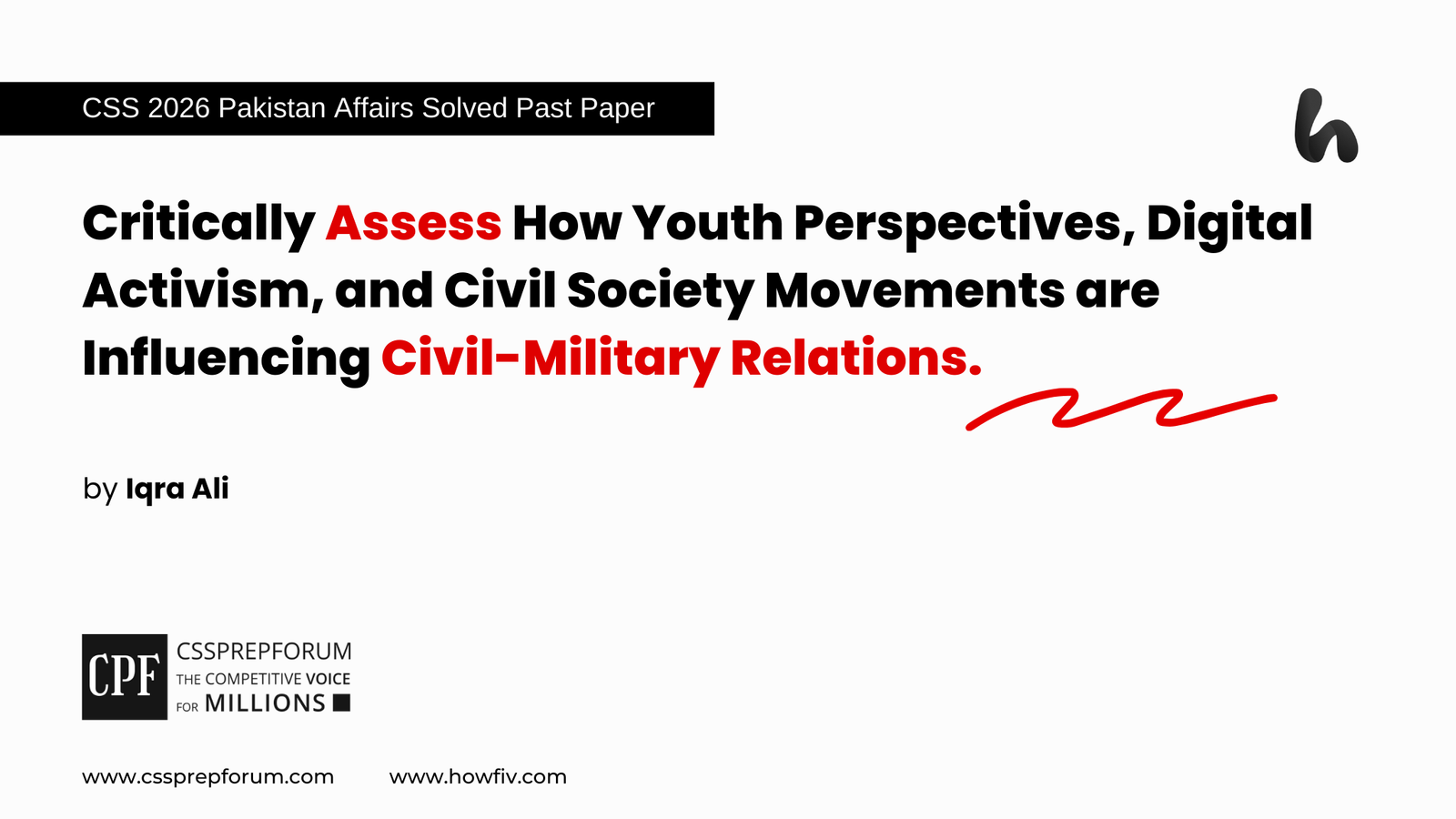CSS 2011 Solved Current Affairs Past Paper | Climate Change Impact, its implications on Pakistan, and management through Policy and Practice
The following question of CSS Current Affairs 2011 is solved by Sir Ammar Hashmi, the best Current Affairs Coach, on the guided pattern of Sir Syed Kazim Ali, which he taught to his students, scoring the highest marks in compulsory subjects for years. This solved past paper question is uploaded to help aspirants understand how to crack a topic or question, write relevantly, what coherence is, and how to include and connect ideas, opinions, and suggestions to score the maximum.

Question breakdown
This question has three parts.
1- Ways to manage the implications of climate change on Pakistan
2- Defining climate change and giving a brief overview
3- Elaborating on the implications of climate change on Pakistan
Outline
1-Introduction
2-Climate Change, a Deadly Evil
3-The Impacts of Climate Change
- ✓Environmental impacts
Case Study: Climate change leads to rising temperatures, melting glaciers, and altered precipitation patterns.
- ✓Health Impacts
Case Study: Waterborne diseases, heat waves, and mental illnesses following floods and droughts are linked to climate change.
- ✓Economic impacts
Case study: Power outages, infrastructure destruction, and agricultural losses due to climate change have significantly impacted Pakistan’s economy.
- ✓Social impacts
Case study: Intractable migration, food insecurity, and social unrest resulting from power outages during disasters are some of the social impacts of climate change.
4-Assuaging the Impacts of Climate Change
- ✓Risk reduction
- Strengthen the functioning of the NDMA, PDMAs, and DDMAs.
- Implement the climate change policy (2013) in total
- ✓Preparedness
- Develop climate-resilient agriculture and infrastructure
- Increase water storage capacity
- ✓Mitigation
- Use land sustainably
- Adapt to the ecosystem
5-Critical analysis
6-Conclusion

Answer to the Question
Introduction
Globalization and technological advancements have propelled the world to new heights and transformed the globe in numerous ways, whether socially, culturally, scientifically, or economically. However, with this pace of advancement, stakeholders have often overlooked the side effects of these efforts to advance and modernize the world. The deadliest of these is climate change, which leads to many secondary sequelae. Amongst the top countries affected by climate change is Pakistan. Climate change has affected the world in general and Pakistan in particular in many ways. For example, it has affected Pakistan’s economy, destroyed crops and fields, affected the social lives of humans, and also impacted the environment. Nevertheless, it is not the end; the condition can still be alleviated if certain policies and practical steps are taken into account, such as proper resource management, climate change awareness, prioritizing renewable energy sources, and implementing climate adaptation measures.
Climate Change, a Deadly Evil
Climate change refers to the alteration of the natural patterns and conditions of the climate. For example, there is a rise in natural room temperature, an increase in sea levels, a shift in precipitation patterns, and a rise in extreme weather events. The reason behind this is the unbridled use of technology and industrialization at the expense of the environment, specifically the climate. For example, most industries worldwide, including those in Pakistan, are powered by coal and other fossil fuels, which contribute to climate change. Climate change slowly and gradually alters the natural climate, leading to numerous secondary and hazardous effects.
The Impacts of Climate Change
There are various negative impacts of climate change that directly or indirectly affect the lives of millions of citizens. The following are some of the most significant impacts.
- ✓Environmental Impacts
First, climate change has affected nearly all aspects of human life. For instance, climate change has caused a significant temperature rise, as stated by the IPCC, which predicts that Pakistan’s temperature will rise by three to five degrees Celsius by 2100. Not only this, but climate change has also been causing the melting of glaciers, especially in the Siachen region, at the rate of 0.5 km a year. A report by the WWF states that Pakistan’s glaciers are expected to melt by 50 percent by 2050. Moreover, climate change has also been responsible for heat waves, especially in 2015 and 2023, which killed around 1200 people. Furthermore, climate change has been a primary driver of changing precipitation patterns, contributing to the disastrous floods in 2010 and 2022. Additionally, it was a contributing factor to the 2019 drought. The Asian Development Bank, in one of its reports, stated that rainfall in Pakistan during the monsoon might increase by 10-20% by 2050. Thus, climate change has impacted Pakistan’s environment up to dangerous levels.
- ✓Health Impacts
Second, climate change has also been a significant contributor to health-related issues. For instance, the heat waves in 2015 resulted in approximately 1,200 deaths. Further, the Pakistan Ministry of Health has reported around 10,000 deaths due to heat-related illnesses in Pakistan. Moreover, climate change has also led to water-borne diseases, such as frequent outbreaks of cholera in 2010, 2023, and 2024, particularly during floods, resulting in a thirty percent increase in diarrhoea and skin infection cases. One of the reports by PIDE states that around 60 million Pakistanis have been affected by waterborne diseases. The WHO indicates that 40% of Pakistan’s water supply is contaminated. These arguments illustrate the impact of climate change on human health in Pakistan.
- ✓Economic Impacts
The third and one of climate change’s most disastrous impacts is its economic impact. The 2010 floods caused approximately $10 billion in economic losses to Pakistan. Moreover, during the 2022 floods, the total economic loss surged to about 30 billion USD. Alongside this, it has affected a 4.5 million-acre agricultural field, leading to the loss of crops and infrastructure, which has caused food insecurity, malnutrition, and an increase in Pakistan’s current account deficit due to increased food imports. The World Bank states that, due to climate change, Pakistan’s agricultural GDP is expected to shrink by an additional 10-15% by 2050. Furthermore, climate change has also damaged livestock and energy infrastructure, resulting in power outages and reduced industrial productivity. These examples illustrate the impact of climate change on Pakistan’s economy.
- ✓Social Impacts
Last, climate change has also impacted the social aspects of human life, particularly in Pakistan. During the floods in 2010 and 2022, more than 1.3 million people migrated from rural to urban areas, and it is expected that around 2 million more may migrate, according to a report by the IOM. Moreover, these floods have also caused food insecurity; for instance, 60 per cent of Pakistanis are food insecure, as indicated by the FAO. Furthermore, one of the causes of social unrest in Pakistan is climate change, which accounts for approximately 20 percent of the total, according to the UNDP. Considering the numerous impacts of climate change, it is clear that climate change poses several significant threats to Pakistan in social terms.
Assuaging the Impacts of Climate Change
However, everything is not yet lost; the poor condition can still be alleviated if specific, scrupulous policies are implemented and practical measures are taken.
- Risk reduction:
First, the Pakistani government should strengthen the functioning of the NDMA, PDMAs, and even DDMAs. This can be achieved by bringing in technical experts to lead them, and a proper budget should be allocated for these institutions. The politicization of these institutions should be eliminated, and effective accountability and audit systems should be implemented on an annual basis. Moreover, Pakistan’s 2013 climate change policy, to develop climate-resilient infrastructure and increase climate funds by 30 percent, should be implemented with zeal and enthusiasm. These aspects will enable the state to reduce the risk of climate-induced disasters.
- Preparedness:
Second, it is inevitable that Pakistan should develop climate-resilient infrastructure, such as Punjab’s climate-resilient agricultural projects, green roofs, and energy-efficient buildings. Lahore’s Orbital Highway is a notable example of climate-resilient infrastructure, and Pakistan needs more of this kind. Furthermore, Pakistan should also focus on water management, such as rainwater harvesting in Murree and Islamabad, as well as watershed management in mountainous regions like Gilgit-Baltistan. Additionally, water storage capacities should be increased, as the government of Pakistan did from 2018 to 2022, to enhance the number of small dams in Pakistan. These aspects will help the state to adopt a proactive approach to climate-induced disasters.
- Mitigation:
Third, Pakistan should focus on sustainable land use, as seen in KPK, and agroforestry should also be implemented in other provinces. More projects, such as the Billion Trees project and urban forestry initiatives, are the need of the hour. These projects have contributed to Pakistan’s welfare; as stated in one survey, the urban forestry initiatives have led to around a 10% increase in total forest cover. On the other hand, the country should implement ecosystem adaptations, such as wetland conservation in Punjab, mangrove restoration in Sindh, which increased coastal protection by 20%, and Agri-forestry in KPK. If these measures are taken promptly, Pakistan will emerge from the climate crisis unscathed.
Critical Analysis
Notably, technological advancements and industrialization, on the one hand, have brought significant benefits to humanity. Still, on the other hand, they have proved disastrous, for they have badly affected the world’s climate. Pakistan is not an exception; although it has contributed less to climate change, the results are distributed globally, irrespective of its contribution to climate change. Pakistan has suffered a lot at the hands of climate change, be it socially, economically, or environmentally. It has slowed down Pakistan’s progress and has pushed Pakistan to the brink of sinking into the dead sea of economic, social, and political turmoil. Unless some sensible measures are taken, it is unlikely that Pakistan will be able to cope with climate change for the next few decades.
Conclusion
To conclude, it is evident that climate change, one of the most pressing global issues, has significantly impacted Pakistan in numerous ways. For example, it has affected Pakistan’s economy, politics, social lives, human health, and agriculture. The worrisome thing is that the impacts are summing up day by day. The only way out is for Pakistan to implement the policies it has put forward and take practical measures, such as climate-friendly agriculture, climate-resilient infrastructure, risk-reduction strategies, and mitigation. Moreover, Pakistan should also collaborate with international organizations to combat climate change-related impacts and decrease their severity. Only then can Pakistan emerge from the crisis.

CSS Solved Past Papers’ Essays
Looking for the last ten years of CSS and PMS Solved Essays and want to know how Sir Kazim’s students write and score the highest marks in the essays’ papers? Then, click on the CSS Solved Essays to start reading them.
CSS Solved Essays
CSS Solved Current Affairs Past Papers
Looking for the last fifteen years of CSS Solved Current Affairs to learn how to attempt them and to score high? Let’s click on the link below to read them all freely. All past papers have been solved by Pakistan’s top CSS Current Affairs coach having the highest score of their students.
CSS Solved Current Affairs
CSS Solved General Science & Ability Past Papers
Want to read the last ten years’ General Science & Ability Solved Past Papers to learn how to attempt them and to score high? Let’s click on the link below to read them all freely. All past papers have been solved by Pakistan’s top CSS GSA coach having the highest score of their students.
General Science & Ability Solved Past Papers











